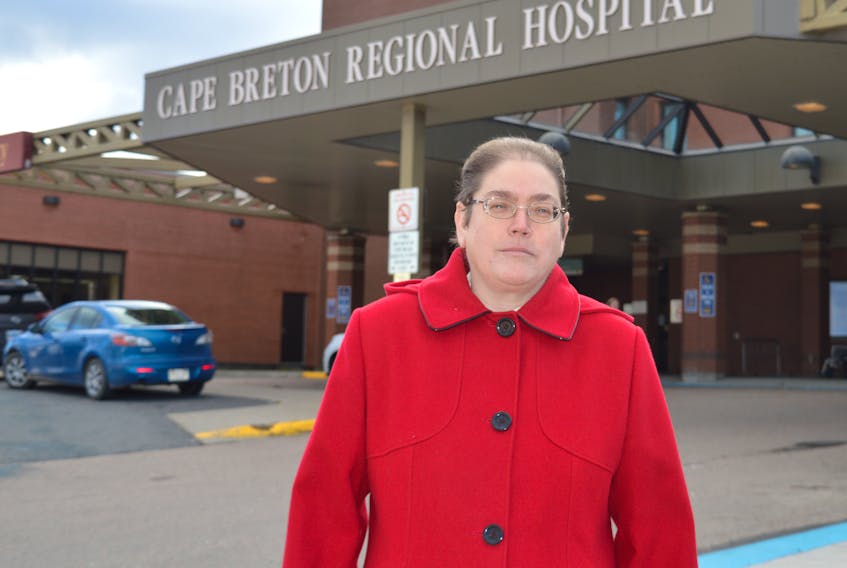SYDNEY, N.S. — Cape Breton’s beleaguered mental health system is about to suffer another blow, with the pending departure of its psychiatric site lead.
And with the province’s health authority touting measures like telehealth as a stop-gap measure to deal with the shortage of doctors, one local physician says it seems to her like administrators’ “hearts aren’t in it.”
With Dr. Scott Milligan, the current complement of psychiatrists stands at five. He has notified the Nova Scotia Health Authority that his resignation is effective Jan. 31. Milligan has declined to do an interview at this time, but he did confirm he is resigning as both site lead and staff psychiatrist.
According to an internal memo written by Milligan in 2017, the department traditionally had 12-14 psychiatrists and historically the full complement may have been about 16 although they had not reached that level in the previous 15 years.
“The state of psychiatry in our area is really quite dire,” said Dr. Margaret Fraser, president of the Cape Breton Medical Staff Association.
“We’re in a mess in mental health. We’re in a mess in pretty much everything right now,” she said.
Fraser said according to her own informal count, the region has lost 14 physicians in the last year. She called the NSHA’s recruitment efforts inadequate and ineffective.
“It really feels like the health authority doesn’t have its heart in it,” Fraser said.
Dr. Andrew Harris, senior medical director for mental health and addictions with the Nova Scotia Health Authority, said in an interview this week he wasn’t aware of the reason for Milligan’s resignation and couldn’t comment on it regardless, as it would be a personnel matter.
He noted there are three psychiatrists currently providing “fairly consistent” locum coverage in Cape Breton, including two psychiatrists who live in Sydney and are in private practice. There is also a senior resident doing a long-term elective.
“We’re managing to gather some resources — it’s not ideal, it’s not optimal, but we’re not leaving the people of Cape Breton unsupported psychiatrically,” Harris said.
“We don’t want to lose Scott. He has been there for many years, he is a huge and valuable resource to the Sydney area.”
Among the measures the authority is using to try to bridge the gap is telehealth, a video conferencing network that connects healthcare facilities across the province.
Harris said more psychiatrists are coming onstream in what he called additional outreach from central zone.
“We’ll be able to provide psychiatric support to the mental health nurses and clinic staff in Cape Breton as well,” he said.
Fraser argued that telehealth has limited value in terms of psychiatry.
“Telehealth is a poor substitute for a face-to-face conversation with a therapist,” she said. “Psychologists can do good therapy but in terms of the drug therapy, the psychiatrists are the ones who are the experts in the prescribing of those medications and they are the ones who should be doing it.
“A lot of it depends on body language, on facial expressions, and you don’t get that through telehealth.”
It may be easier for a patient to conceal certain things about their current state of wellness if they’re not meeting with their psychiatrist in person, Fraser said.
“It doesn’t give you vital details about the patient — you can’t tell how a person smells … you can’t see whether they’ve washed today,” she said.
Harris stressed that mental health operates as a team-based service and the mental health nursing staff carries a great deal of the burden of work.
There are “additional resources” in the form of a clinical associate program that the NSHA had already planned on deploying to help with the situation in Cape Breton, which was actually suggested by Milligan, Harris said. It involves physicians who have generally been trained outside of Canada and work under a specific licence in a semi-supervised environment.
“In Cape Breton, they’ll be working initially primarily on in-patient services working alongside and with mental health nurses and others and they will have collaboration also with psychiatrists working also in those units,” Harris said.
Related: Work to update mental health wait times data in Nova Scotia continues
He described them as “physician extenders” who will allow the NSHA to increase the output and effectiveness of the psychiatrists working there.
There are some irons in the fire, Harris said. The NSHA is trying to recruit students in the program at Dalhousie and elsewhere and is talking with some residents in an effort to get them to commit to working in Cape Breton. The NSHA also took part in a job fair in the United Kingdom, with more than 80 people identified as potentially recruitable to Nova Scotia.
There are currently no firm commitments to come to Cape Breton, but Harris said it’s still early in the process and issues like licensing requirements take time.
Fraser said she can’t say definitively that the complement of psychiatrists with Milligan’s planned departure will be its lowest ever in the region, but it’s the worst she has seen since she began practising here in 2010.
“I can’t imagine it’s ever been this low before, really,” Fraser said.
She noted it puts additional pressure on emergency departments and also on family doctors, adding the potential lack of continuity in care complicates the ability to build a therapeutic relationship and trust
Wait times for community-based adult mental health services aren’t currently being publicly updated while the system for tracking those times is changed. The most recent wait time published more than a year ago stood at 363 days.









